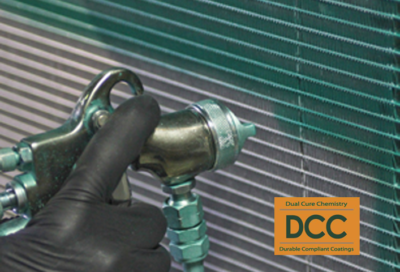Protecting Your Commercial HVAC Coils: A Smart Investment
Choosing the right coating can safeguard your coil from corrosion and prevent costly repairs down the line.
As time goes on, your commercial HVAC system's coil will inevitably face wear and tear from exposure to harsh environmental conditions or galvanic corrosion. This degradation leads to higher energy bills, increased maintenance expenses, and the potential need to replace the coil prematurely. One of the most efficient ways to extend the life of your coil is by applying a protective coating.
Applying a coating to your HVAC coil helps defend against corrosion caused by a wide range of contaminants while maintaining optimal performance—even in extreme environments. But with numerous options available, selecting the right coating can feel overwhelming. Over the years, we've worked with several different types of coatings, each offering distinct benefits and varying levels of effectiveness over time. Based on our experiences, one of the top choices we recommend is Energy Guard USA.

Why Energy Guard?
Throughout our work with Energy Guard coatings on both custom and OEM replacement coils, we've found their products to be among the best in the market. They provide an affordable, eco-friendly solution to combat corrosion. Here's why they stand out:

• Their proprietary DCC formula (Dual Cure Chemistry) penetrates deeply into the coil structure and dries quickly—usually within 15 minutes—reducing labor costs significantly.
• The coating contains 30% aluminum flakes, enhancing thermal conductivity and improving heat exchange efficiency. It also possesses anti-microbial properties that inhibit mold and mildew growth.
• With a thickness comparable to that of a human hair (just 1 mil), this coating won't flake off, obstruct airflow, or hinder performance.
• Coated coils pass rigorous 10,000-hour salt spray tests (ASTM B117), showcasing exceptional durability under challenging conditions.
• Made with high solids and low VOCs, Energy Guard USA coatings have minimal volatile organic compound emissions, making them environmentally friendly.
• Trained professionals oversee every step of the application process to guarantee superior results.
How Much Does It Cost to Coat a Coil?
The price for coating depends on factors like the coil's design, including its square footage, row count, and fins per inch. If you're getting a quote for a custom or OEM replacement coil, consider asking about adding a protective layer at that stage—it tends to be more economical than doing it later. While it’s technically feasible to apply a coating post-installation, additional charges may apply.
Will a Coated Coil Last Longer?
Definitely! Adhering to regular maintenance practices ensures a coated coil could last twice as long as an uncoated one. However, keep in mind that while a coating protects against corrosion, it doesn’t eliminate the need for routine cleaning. Dirt buildup can still occur, so continue maintaining your coil just as you would without a coating. Keeping the surface clean allows the protective layer to remain intact, ensuring prolonged protection against corrosion for many years to come.
This article was crafted by seasoned commercial HVAC experts with nearly two decades of industry knowledge. Our goal is to share valuable insights into commercial HVAC solutions and invite readers to reach out via email with any questions or comments they might have.
Mini Cnc Lathe,Cnc Metal Turning Lathe,Mini Auto Turning Lathe Machine,Cnc Mini Wood Turning Lathe Machine
JARRY CNC MACHINERY CO.,LTD , https://www.jarry-machinetool.com